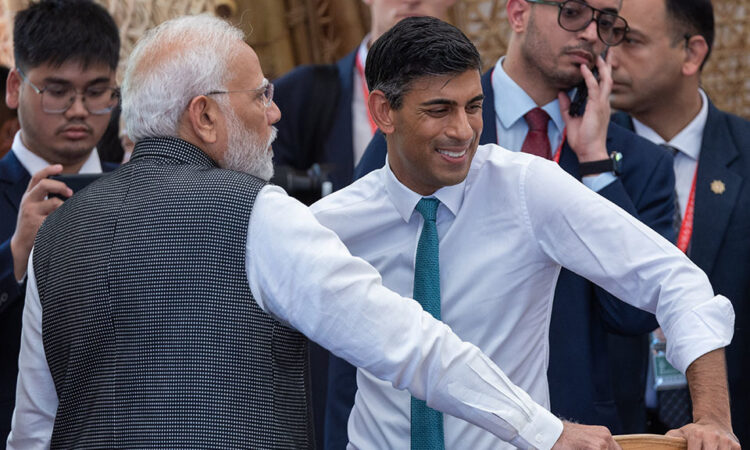
- PM will emphasise the importance of Indo-Pacific security and prosperity at the G20 in Indonesia, announcing a new partnership with India
- At today’s Summit the PM will meet the leaders of India, Australia and Indonesia as well as President Biden
- PM will also meet Chinese President Xi to underline the need for a frank and constructive UK-China relationship
The Prime Minister will emphasise the importance of the Indo-Pacific region to global security and prosperity as he continues to hold talks with his counterparts at the G20 Summit in Indonesia today (Wednesday).
This week’s G20 meeting is the largest gathering of global leaders in the region since before the coronavirus pandemic. In the time since a British Prime Minister last visited Southeast Asia, the region and the Indo-Pacific as a whole has only become more important to the UK’s security and prosperity.
The UK has committed to building the broadest presence in the Indo-Pacific of any European country. We have already strengthened our ties with the region, including through our work with Japan to develop the next generation of combat aircraft, the AUKUS pact with Australia and the USA and Just Energy Transition Partnership with Indonesia.
The UK was the first country to achieve Associate Partner status in the Association of Southeast Asian Nations this century and has applied to join the Comprehensive and Progressive Agreement for Trans-Pacific Partnership.
Today the Prime Minister will meet regional leaders, including Indian Prime Minister Modi. In that meeting they will confirm a new bespoke, reciprocal route will open in early 2023 to give young professionals from the UK and India a once-in-a-lifetime opportunity to take part in a professional and cultural exchange.
India is the first visa-national country to benefit from such a scheme, highlighting the strength of the UK-India Migration and Mobility Partnership agreed last year.
The Prime Minister said:
The Indo-Pacific is increasingly crucial for our security and our prosperity. It is teeming with dynamic and fast-growing economies, and the next decade will be defined by what happens in this region.
I know first-hand the incredible value of the deep cultural and historic ties we have with India. I am pleased that even more of India’s brightest young people will now have the opportunity to experience all that life in the UK has to offer – and vice-versa – making our economies and societies richer.
Under the new UK-India Young Professionals Scheme, the UK will offer 3,000 places annually to 18–30 year-old degree educated Indian nationals to come to the UK to live and work here for up to two years. The scheme will be reciprocal.
The launch of the scheme is a significant moment both for our bilateral relationship with India and the UK’s wider commitment to forging stronger links with the Indo-Pacific region to strengthen both our economies.
The UK has more links with India than almost any country in the Indo-Pacific region. Nearly a quarter of all international students in the UK are from India, and Indian investment into the UK supports 95,000 jobs across the UK.
The UK is currently negotiating a trade deal with India – if agreed it will be the first deal of its kind India has made with a European country. The trade deal would build on the UK-India trading relationship, already worth £24 billion, and allow the UK to seize the opportunities presented by India’s growing economy.
In parallel to the mobility partnership with India, we are also strengthening our ability to remove immigration offenders. A landmark Memorandum of Understanding was signed between the UK and India in May 2021 aimed at increasing mobility between our countries, returning those with no right to be in the UK and India respectively and sharing best practice on organised immigration crime.
Today at the G20 the Prime Minister will meet Chinese President Xi – the first British Prime Minister to do so in almost five years. He will be clear on the need for China and the UK, as permanent members of the UN Security Council and major global economies, to establish a frank and constructive relationship.
The challenges posed by China are systemic and they are long-term. China is a country with fundamentally different values to ours, with an authoritarian leadership intent on reshaping the international order.
But none of the issues the Prime Minister is discussing at the G20 – the global economy, the impacts of the war in Ukraine on food and energy security, climate change and global health – can be addressed without coordinated action by all the world’s major economies. That includes China.
The Prime Minister will encourage China to use its place on the global stage responsibly to resolve geopolitical tensions, ensure regional stability and play its part in tackling the devastating global impact of the war in Ukraine.
He will stress that the pre-condition for any UK-China engagement will always be the UK’s national security, including our economic security. And he will underline the importance the UK places on defending human rights and of speaking out and taking action where we have concerns – as we have done over Hong Kong and Xinjiang.
Work is currently underway on an update to last year’s Integrated Review to take account of Russia’s full-scale invasion of Ukraine and the evolving challenges posed by China.






